From the DC's Desk
All Salvationists and friends of the Ontario Central-East Division are delighted to warmly greet fellow labourers with Christ throughout the Canada and Bermuda Territory. My wife, Myra, and I are writing this from IHQ, London,
England, in the last few days before we return home to join you in the “good fight of faith.” Here, we have been repeatedly reminded through our travels that The Salvation Army is a wonderful, vibrant expression of the resurrection life and power of the Lord Jesus Christ in 121 countries of the world.
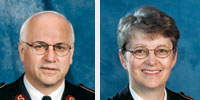
The division is committed to joining you in being an authentic witness to the redemptive power of the gospel to the world that has come to our doorstep. We will, by God's grace, explore effective ways of establishing and maintaining healthy corps, connecting with children and youth, strengthening leadership and coming alongside the marginalized and disadvantaged.
We believe God is shaping all of us to be a people of faith who think with the mind of Christ, love with the heart of Christ and serve with the hands of Christ.
Lt-Colonel Wayne Pritchett, Divisional Commander
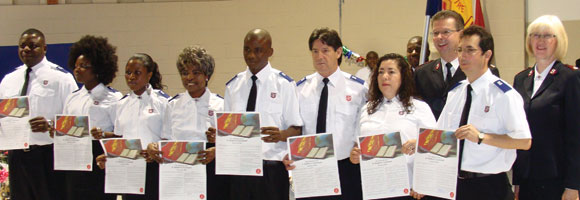
Many Nations, One Lord
If you phone Yorkwoods Community Church in the notorious Jane-Finch neighbourhood of Toronto, you may hear the answering machine message that says, “We are a congregation with many nations, but one Lord.”
The corps has a diverse multicultural membership, with 22 countries represented, from Jamaica to Angola, Argentina to Ecuador, China to Iran.
When asked what their strategy is for connecting with the multicultural community, Aux-Captain Alice Ludiazo-Nsona, corps officer, puts it simply: “People at our family services and in our neighbourhood come from many countries. We just talk to them, explain who we are and invite them to come have a look at our church services. Once they come, they usually stay.”
When newcomers visit the corps on a Sunday, they see that people from many nations are not only welcomed as members, but given leadership positions. The corps officers are from the Democratic Republic of Congo, and the musicians, Scripture readers and ushers are all from diverse ethnic backgrounds. During prayer time, everyone is invited to pray in their mother tongue, including English, French and Spanish. These three prominent languages are used for singing and Scripture reading.
“People from other countries come to Canada with a lot of gifts and we need to give them space to express and use them for God,” explains Aux-Captain Alain Suamunu-Luasu, corps officer. “Carlos Lopez used to pastor a Spanish-speaking congregation at People's Church in Toronto, so we recruited him to lead our Spanish ministry through our family services food bank.” In January, Lopez was one of eight new senior soldiers enrolled at Yorkwoods.
Oliver Kamara is also one of the new soldiers. He was new in the neighbourhood, and when he passed by The Salvation Army, he came inside to look for the pastor. A former Muslim, Kamara's son had been disabled with poor health from birth. He prayed, “God, if you heal my son, I will do whatever you ask me to do.” When he brought his son back to his home country of Sierra Leone, the son died. When Kamara shared the story with Aux-Captain Luasu, they talked together for a long time about how this could have been God's way of keeping his son from further suffering. Seeing this as an answer to prayer, Kamara is now evangelizing and considering officership.
When asked about the key to multicultural ministry, Aux-Captain Luasu has a quick answer: “Love. No matter where people are from or what their background is, everyone needs love, and everyone needs friends. Open the doors of your hearts and get to know people on a deep level. We are all the same in God's eyes.”
Soup, Soap, Salvation and Scrubs
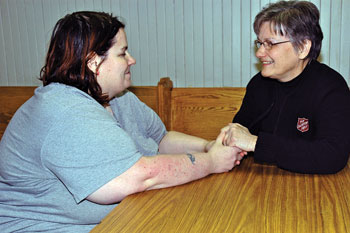
Poor health is both a symptom and a cause of poverty, which means that marginalized people often have difficulty accessing adequate health care. The Salvation Army at Gladstone Community Church in Ottawa is reducing poverty by addressing the health needs of the poor and marginalized in its community. The approach is one of holistic care that promotes health in body, mind and spirit.
Judy McIntosh is an outreach nurse who has been at Gladstone for the past 12 years, serving full-time for the past three. Some days, she is making house calls behind dumpsters or washing people's feet in a basin. Other days she is running the corps' Fit for Life women's group or holding health assessments at the drop-in centre. One-on-one counselling, flu shot clinics and health advocacy work are also a part of her ministry, in addition to updating a bulletin board with current health information and holding group sessions on current health issues.
McIntosh works closely with Captain Ginny Kristensen, corps officer, and they are both passionate about community health ministry in The Salvation Army.
“Health ministry is a natural fit with spiritual care,” explains McIntosh. “People who come for the walking group can receive counselling during the walk. People who come to get their blood pressure checked can get prayer at the same time. Most of the people I've surveyed say that nursing makes the church more relevant to them. Addressing people's physical, emotional and spiritual health shows that we care about people totally.”
McIntosh's experience is that some people who are shy about baring their souls will ask for their temperature or blood pressure to be checked. While that is being done, emotional and spiritual issues are often shared. The corps also connects with a variety of health, housing and inner-city networks.
“Gladstone is a mission church where people find community, reducing their social exclusion and poverty,” says Captain Kristensen. “Every person that comes is poor or marginalized in some way, and we show each other unconditional love. If you're looking for nice pews and the standard Salvation Army, we're not it!”
Since they are offering soup, soap, salvation and scrubs, William Booth might argue that they are the original model of The Salvation Army.
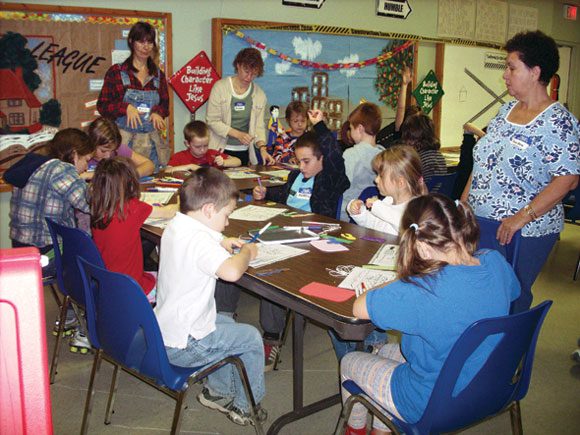
School's Out, But the Army's In!
The village of Fenelon Falls is a close-knit retirement community of 1,800 in a rural area of northern Ontario. With one high school and one public school, it may seem like a difficult place to engage youth and children, but The Salvation Army is up for the challenge. The corps officers, Captains Michael and Carolyn Simpson, are passionate about getting to know the young people in their community and introducing them to Christ. They participate on the parent-teachers association, coach football at the high school and recently had a barbecue at their house for the children and parents at the local daycare.
Whenever there is a professional activity or development day at the school, the corps at Fenelon Falls opens its doors to the children of the community so that parents can still go to work. Kids bring their own lunch and pay $5 for a full-day program.
“I got this idea from a United Church minister in Georgetown, Ont., and thought we should try it,” says Captain Carolyn Simpson. The morning program is structured on vacation Bible school material. Then, in the afternoons, they take the children on field trips. In the past year, they have visited the fire hall and the post office, and in December, followed a Christmas theme with crafts, gingerbread cookies and games.
Captain Simpson places ads for the program on the school notice board, as well as in the grocery store, laundromat and library. She also wrote an article about the program for the local newspaper, and all family services clients are told about it. Christian volunteers, who are mostly retired people who want to see children come to know the Lord, support and help staff the program.
Timothy is a young boy who comes to the day program. Despite his significant behavioural challenges, volunteers spend quality time with him and have had some positive influence in his life. His family appreciates the good care he receives and now comes to Elevate, a contemporary café service run out of the corps.
“The program is perfect for a small corps,” explains Captain Simpson. “It's economical, but has a huge impact.”
Bolstering the Ranks
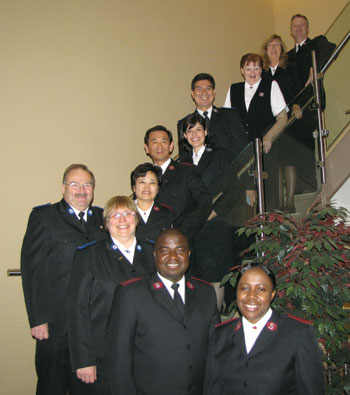
The Ontario Central-East Division has a cohort of 11 auxiliary-captains who work alongside other officers as valuable members of the leadership team. Auxiliary-captains are “second career” officers who are serving full-time in meaningful appointments while they take courses through the College for Officer Training (CFOT), William and Catherine Booth College and other approved teaching centres.
The auxiliary-captains in the division are Fabio Correa and Angelica Hernandez (serving at Yorkminster Citadel and Immigrant and Refugee Services, Toronto), Ron and Linda Farr (serving at the Warehouse Mission, Toronto), Rob and Micheline Hardy (serving at Hope Acres Community Church, Glencairn, Ont.), Alain Suamunu-Luasu and Alice Ludiazo-Nsona (serving at Yorkwoods Community Church, Toronto), Sandra Ross (serving at Toronto Harbour Light) and Thomas and Tina Yoo (serving at Ottawa Citadel).
The training for the auxiliary-captains comes under the leadership of Captain Robert Russell, distance education officer, CFOT. In addition to distance education studies, once a year they gather as a group, along with other auxiliary-captains across the territory, for a two-week intensive course. After the successful completion of the program (usually within a five-year period), the auxiliary-captains will be ordained and receive the rank of captain.
“Auxiliary-captaincy is a challenging and stretching experience, which is strengthening my leadership 100 percent,” says Aux-Captain Rob Hardy. Fifteen years ago, Aux-Captain Hardy entered the Harbour Light program in Toronto. After completing the program, he felt a calling from God to live out the mission of the “old-time Booth” Army of 1865. He and his wife considered officership, but at the age of 48, they thought that door was closed to them.
“When the door of auxiliary-captaincy opened up, we knew we were called to move forward in his will, and ever since we have felt deep peace about this decision,” he says. Aux-Captains Hardy worked as employees at the Toronto Harbour Light for nine years before becoming the corps officers at Hope Acres. When asked about the difference between being an employee and an auxiliary-captain, Rob Hardy says, “People have different perceptions of you when you're the captain, and in terms of accountability and decision-making, everything finishes with you. But I don't notice a difference because of my rank.”
“The division and territory are certainly proud of this fine group of Christian Salvationist leaders,” says Captain Russell. “They represent a diversity of ethnicity, age and experience greatly needed in The Salvation Army today. In the days to come we look forward to seeing the amazing ways in which God continues to call and equip new leadership in The Salvation Army.”
For more information on auxiliary-captaincy, visit cfot.ca/auxiliary-captains.
Keeping it Real in Bracebridge
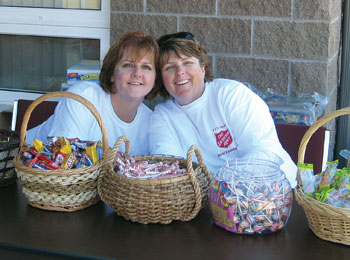
Bracebridge is a rural community of 18,000 people in northern Ontario. The local Salvation Army is the community church—not only by name but because they are part of the fabric of their area. According to the Natural Church Development results, Bracebridge Community Church is one of the healthiest churches around. Captain Christopher Rideout, corps officer, attributes this to the fact that they are outward-looking and relationship-based.
“A key to ministry in rural areas is authenticity and transparency—being real,” explains Captain Rideout. “As the officers, we need to be as honest and open as possible. We can't hide behind the cross; we need to shine through it. The truth is we just build relationships with people and wear the label of Christ in the community.”
Whether it's at the mayor's breakfast, community picnic, scene of disaster, coffee shop or grocery store, all corps members actively reach out and bring the witness of Christ to their neighbours.
The Army in Bracebridge tries to knock down barriers about “church” activities and strives to include people from the neighbourhood in all aspects of church life.
Matthew hadn't been to church in 20 years, but heard about the church's Quest for Authentic Manhood group and joined. His life was so transformed by participating in authentic community that his wife and children started attending church services.
“We're a congregation of broken people, and we accept and love one another,” says Captain Rideout. “We don't hide behind holiness, and we're not judgmental.”
The Rideouts' goal is to help populate Heaven, not their own church. But by focusing on the community, they are seeing growth within their congregation.

FAST FACTS
• In 2009, the second stage of the divisional restructuring was completed to form what is known as the Ontario Central-East Division
• This division encompasses what was formerly the Ontario Central Division, the Ontario East Division and half of the Ontario North Division. The borders are Peel Region to the west, the Quebec border to the east, the St. Lawrence Seaway and Lake Ontario to the south, and Parry Sound and Huntsville to the north
• There are 57 corps, which represent a huge diversity of size, culture, worship style and ministry
• The 37 social ministry units include: men's and women's shelters; addiction programs; long-term care; programs for developmentally handicapped adults; violence against women program;
services for sex trade workers; anti-human trafficking initiatives; summer camps for children; youth centres; emergency and disaster services
• There are five community response vehicles and two street feeding vehicles (mobile kitchens) responding to emergencies and the daily needs of marginalized individuals
• Annually, the 56 community and family services units (all connected to corps) assist over 90,000 families. More than 33,000 families and singles were assisted at Christmas with grocery gift vouchers and hampers, and over 65,000 children were given Christmas gifts
• There are 29 Salvation Army chaplains working in the corrections system (courts, detention centres and youth custody facilities) and in social units
• The division operates 855 emergency shelter beds in Toronto as well as 98 transitional housing beds and more than 361 emergency beds in Peel Region. Nineteen locations offer 610,280 shelter-bed nights, which are made available for the homeless 365 days a year, and the division serves over 1.2 million meals per year
• The Salvation Army is the largest non-profit provider of emergency shelter beds within Toronto
Click here to read other divisional profiles in this series.





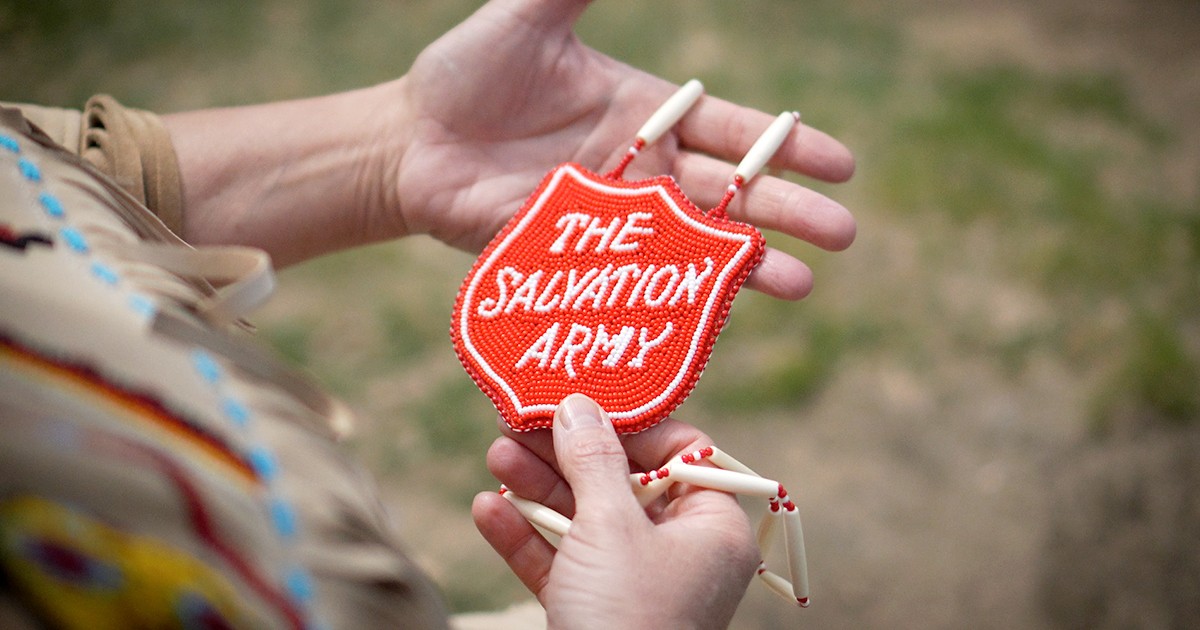



Leave a Comment